8. Energy Supply in Japan
@31/Aug/2005
RSS Eurasia Club/JICA SV in RSS Amman Jordan
[Purposes] [Coordinator Office] [Schedule] [Materials] [Top]
1. Abstract:
Japan has scant natural resources that are badly needed for highly developed
industry to sustain basic lifeline of people of the country. Especially,
as for the energy, Japan has to import 93% from foreign countries. This
is the worst case among the industrial leading countries in the world.
That is one of the strong driving force of our country's strategy of foreign
affairs and industrial strength of manufacturing super high quality products
shipping to the global market.
At the end of WW II, 80% of energy supplied domestically. Most of energy
sources were coal and hydraulics. With rapid industrial growth, energy
demands in Japan was seven held by 1973 and domestic supply dropped as
low as 10%. That year, the 1st oil shock struck the world. Price of the
crude oil jumped from 2 dollars per barrel to 11 dollars per barrel. Many
industrial countries including Japan was severely struck and lost its competitiveness
in the global market due to price hike induced by 6 held high crude oil
price. Industries of most of western countries had been beaten flat and
their economy dramatically recessed.
But Japan had miraculously survived this extremely hard environments of
1973. The country had continued its economic glows in such adverse conditions
that no one else could have achieved. Japanese industrial leaders and whole
nation understood the situation with their heart and body. Whole Japanese
people worked very hard and took every idea to reduce energy, cut the cost
and time to the minimum with maximum efficiencies, including from executives
of the company to the house wife.
Quality is always the top priority in all area, purchase, production, transportation,
services, management and etc. We knew that once the quality drops, no one
will buy our products anymore, that instantly and easily destroy the highly
developed, but at the same time, so vulnerable our economy. Because, Japan
is the country who lives on its export of their products made from law
materials imported from abroad, back again to abroad. Decline of the export
directly and instantly affect the life of people of the country. So, it
is essential to keep the quality and continue export our products to the
foreign countries.
To overcome this hard situation, TQC activities had fully deployed in every
part of organization from small company to the governmental body. People
respected any small idea that helps saving energy consumption, improving
performances, keeping quality and cut the prices. Tens of thousands of
new, sometimes funny, ideas are proposed and tried each day throughout
the country. Majorities of these ideas had been disposed, but people never
stop proposing ideas after another. Thus, Japan not like other industrial
countries, miraculously survived the 1st oil shock in 1973.
After six years from the 1st oil shock, in 1979, another oil shock struck the world again. The crud oil price jumped 3 time to 34 dollars per barrel. This time Japan had again miraculously survived with the same whole national efforts with hard work and millions of small improvements proposed by everyone from workers to the top executives. TQC activities were then really matured and worked in full motion. Once exporter of QC methods, USA had re-imported TQC from Japan to overcome the 2nd oil shock that struck the country's economy so badly.
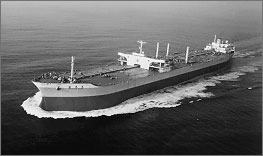
Fig.1 Colossal Oil tanker "Idemitsu-Maru": carries 209,000 tons of crude oil a time
The capacity of this ship is equal to one day consumption in Japan
2. Energy Supply in Japan:
In the below enclosed graph, amount of energy supply from year 1953 to
year 2001 is shown. At the same time, percentage ratio of domestic supply
is also shown in black dotted line.
The total energy supply sharply had increased till the year 1973, the year
of 1st oil shock struck the world. From this year, the total energy supply
of Japan stay constant till year 1979, the year of another oil shock struck
the world again, so called 2nd oil shock, despite of Japan's continued
economic grows in this period. Energy supply in Japan ever had stayed remain
constant till year 1982. These two oil shocks had struck badly the economy
of most western countries. But only the economy of Japan had survived these
two unprecedented nightmares, and had kept glowing healthy, with Japanese
people's strenuous effort to reduce the cost to minimum and keep the quality
with every single idea and possibilities. They removed all factors in materials,
design, work process and management that contributes to cut the cost. Consequently,
economy of Japan had kept glowing but energy supply kept constant for these
extremely hard period. Since then, import of crude oil is kept almost constant
despite of continued growth of country's economy till today.
The domestic energy supply ratio is dangerously dropped to as law as 10%
in the year 1973. Nuclear power plant had just started its operation in
that year, and expanded its capacity accordingly. Today, as much as one
third of total electricity demands is produced by nuclear energy.
Several kind of energy sources are used, these are;
- Nuclear: in Red colored area in the top
- Natural Gas: Green colored area, 2nd from the top
- Others: Blue colored area, 3rd from the top
- Crude Oil: Gray colored area, 4th from the top
- Coal: Brown colored area, 5th from the top
- Hydraulic: Blue colored area in the bottom
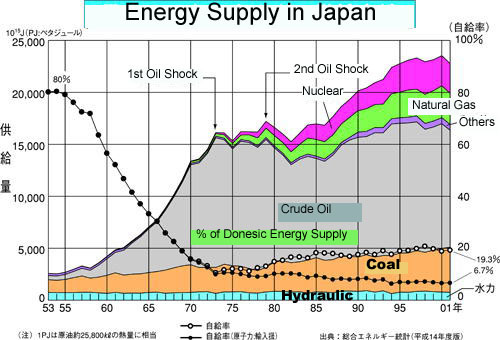
Fig.2 Glows of oil supply and decline of domestic supply ratio
Today, Japan heavily depends on imported energy resources
3. How Efficiently Japan uses Energy:
Since Japan has to import majority of energy sources from abroad, efficiency
of energy consumption is major concern for everyone of Japanese people
and industrialists. From the early day of industrialization in Japan, people
always had made every effort continuously to maximize the energy efficiency.
Thank s to this rather thrift and strenuous national effort, Japan has
ever been in the top of energy efficiency among industrial countries.
Fig.3 below shows energy consumption per GDP of the major industrial countries.
It is obvious from the figure that Japan is unquestionably excellent of
using energy efficiently. Roughly only one third of energy Japan consumes
to produce the same amount of output compared with Canada and USA.
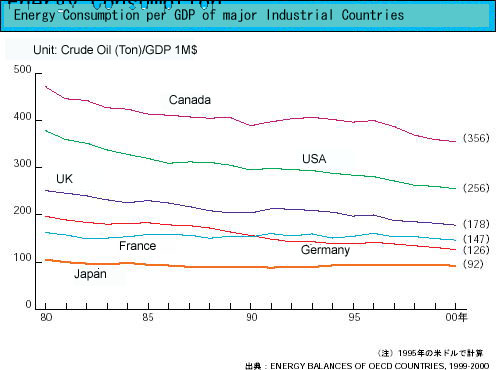
Fig. 3 Energy Consumption per GDP of major industrial counties
Japan is ever top among all nations
Figure.4 shows energy required to produce unit GDP (Yen) in Japan.
From this graph, it is easy to understand that Japan made great success during 1st oil shock in 1973
and 2nd oil shock in 1979.
Energy required to produce unit GDP dramatically dropped during that period of adverse economic conditions.
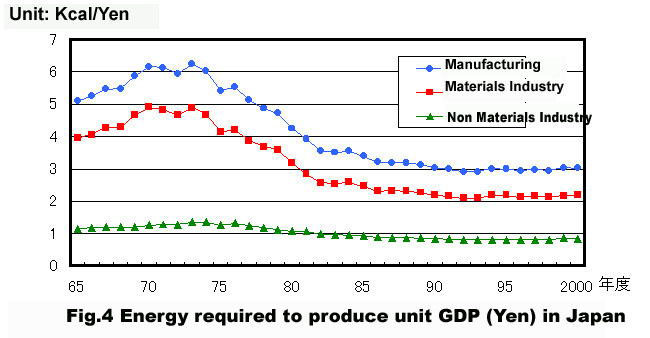
Fig.5 shows GDP growth vs total energy consumption in Japan from 1965 to 2000.
From this figure, you could easily notice two important factors.
One is GDP of Japan had ever continuously grown even the world had struck by severe oil shock twice in 1973 and 1979.
Second, energy consumption had kept constant after the 1st oil shock in 1973 for about score of year.
This achievement had been made with deep penetrated common conception of energy saving into the people all over Japan
from the school children to house wives, teachers, workers, managers, artists, politicians and etc.
Whole nation had struggled strenuously against the huge obstacles standing ahead of us.
They were willingly worked extra hours. They were willingly accept extra assignments.
They removed every bits and pieces of unnecessary process or combined the several processes
into one to reduce time and cost.
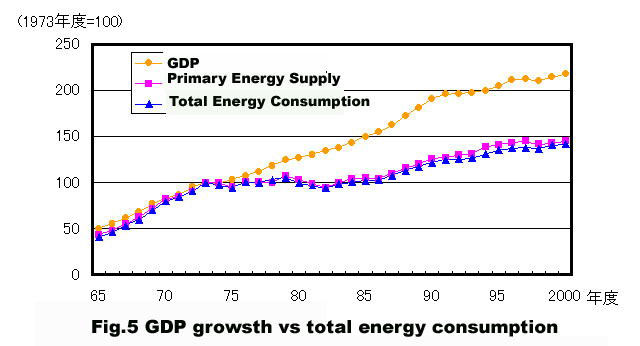
4. Environmental Concern:
Fig.6 shows the relation between the total CO2 exhaust and GDP of major
countries in global basis. The top CO2 exhaust country is USA, they exhaust
one fourth of global CO2 output. Japan is fourth, except EU among the world,
exhaust 5.1% of the global CO2 output vs 17% of GDP in global basis. You
could notice that compared with other top three CO2 exhaust countries,
namely, USA, China and Russia, Japan is extremely low CO2 exhaust country
vs GDP amount. In other words, Japan is most energy efficient country among
the world.
Environment of our planet is very vulnerable. If it was once destroyed,
it is extremely difficult to restore it to the backwards.
Total effort of environmental friendly actions are matter of urgency in every part of activities
in everywhere on earth.
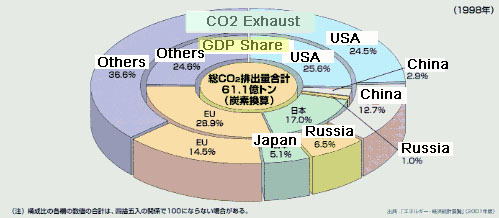
Fig.6 CO2 exhaust vs GDP of the global basis (2001)
Japan's GDP is 17% of the world, while only 5.1% CO2 exhaust
5. Who are the supplier of Japan's mostly needed Energy Resources:
Before the 1st oil shock in 1973, percentage of energy supplied by oil
was as large as 77.4%. After the 1st oil shock, Japan took two strategies
on energy supply. One is to increase the efficiency of energy consumption.
This story was talked in the above paragraph. The other is to reduce dependency
on oil and increase the percentage of other sources like gas or nuclear
energy. We made continued and difficult effort to achieve the target. Thanks
to all concerned people all over Japan, percentage of oil dependency dropped
to as small as 49.4% in 2001. Nuclear energy and natural gas has been taken
into our energy supply line. However, still half of our energy supply depends
on oil.
Figure.8 shows from where we are importing much needed oil.
You could easily read that our energy supply is largely depend on the oil from middle eastern countries,
namely 90% of of all imported oil are coming from that region.
If we lose this supply line by some reason,
our economy and people's life would be shot down instantly and only the real chaos would be left over our land.
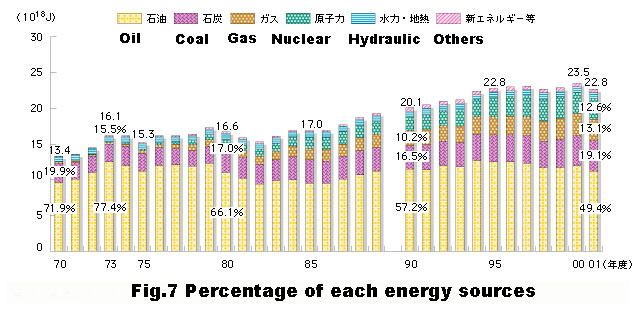
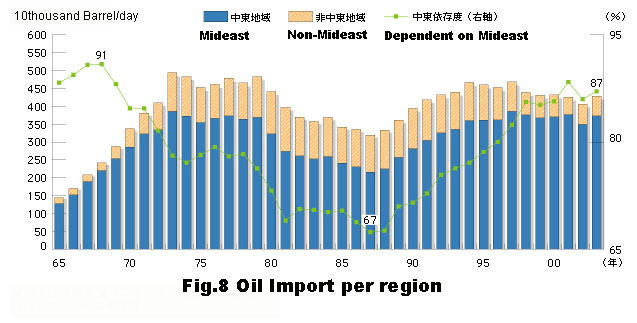
6. Energy Strategy on Future Demand:
In order to keep the sustainable development and cleaner environments,
shift of energy supply sources shall be required in the matter of urgency
as the global basis, as well as the effort of saving energy from individual
basis to national level. Development and deployment of cleaner and safer
energy are real essential. Japan is now making their best effort to develop
and use of cleaner natural energy like solar or wind. Natural gas is one
of good alternative as cleaner energy sources as it can suppress CO2 emission
tremendously. Nuclear energy is another alternative. Already one third
of electricity supplied in all over Japan is produced by nuclear power.
Safety measures and security for non-proliferation to military use shall
strictly be taken in order to save the fate of human races in our offspring.
Live with less energy
Use energy wise
Live in simple
Find joy in nature
Love slow life
Reserve beauty of the planet
| [Coordinator Office] [Purposes] [Schedule] [Materials] [Top] |
| [Back to Page Top] |